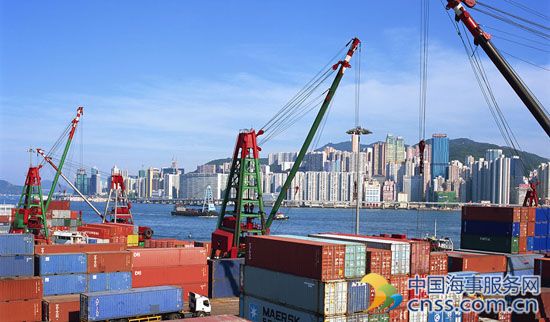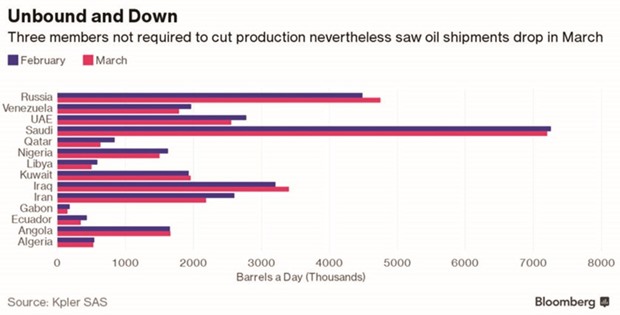Opec’s oil exports seen dropping further in March by cargo tracker

Opec’s oil exports dropped further this month as several countries not bound by the group’s historic supply deal curbed shipments, according to cargo-tracking company Kpler SAS.
Iran, which was permitted to increase output in last year’s supply deal, led the declines with a drop in exports of 416,000 bpd to 2.185mn, according to cargo data compiled by Paris-based Kpler. Nigeria and Libya – exempt from the agreement – reduced shipments by a combined 209,000 bpd. The UAE showed the first significant export drop since the accord came into force in January, with a reduction of 220,000 bpd.
The Organization of Petroleum Exporting Countries’ November agreement focused on curbing production rather than exports, but cargo-tracking data is often used as a way to monitor implementation of output cuts. The accord requires 10 out of Opec’s 13 member countries to slash output by 1.2mn bpd from October levels for a period of six months starting January 1. The group’s own data showed they exceeded that target in February.

Total Opec exports in March dropped by 1.18mn bpd from the previous month to 24.4mn, according to data from Kpler, whose clients include hedge funds, oil majors and physical traders. Compared with October, exports were down by just 800,000 bpd this month, the data show.
The drop in exports from Iran includes about 135,000 bpd of crude and 155,000 bpd of a light oil called condensate, Francois Cazor, co-founder and chief executive officer of Kpler said. Shipments were lower because some Iranian crude went to the nation’s refinery at Bandar Abbas rather than to international markets, he said. Under the November 30 agreement, Iran was allowed to increase its output to 3.797mn bpd from a level of around 3.7mn. That’s after Iran insisted it needed to recover its market share following years of sanctions that penalised its oil industry until January 2016.
Exports from the UAE showed the second-largest decline in March, dropping almost 8% to 2.56mn bpd, the data show. In February, Opec estimated that the Gulf country had pumped more than its target of 2.874mn bpd. Energy minister Suhail al-Mazrouei pledged on Tuesday to go below that level in March, April and May.
Russia – which isn’t part of Opec but promised to contribute its own cut of 300,000 bpd – increased exports by 5.9% to 4.75mn bpd in March. Russia so far has cut its output by 185,000 bpd, Energy Minister Alexander Novak said in Kuwait City on March 25. That rising trend is set to continue next month, when ports in Russia are due to ship the most crude to world markets in at least nine years, according to shipping data compiled by Bloomberg.
Kpler was co-founded in 2009 by Francois Cazor and initially tracked cargoes of liquefied natural gas, before launching a crude cargo tracking product this year.
Source: Bloomberg
HEADLINES
- Do shipping markets want Biden or Trump for the win?
- All 18 crew safe after fire on Japanese-owned tanker off Singapore
- Singapore launching $44m co-investment initiative for maritime tech start-ups
- Cosco debuts Global Shipping Industry Chain Cooperation Initiative
- US warns of more shipping sanctions
- China continues seaport consolidation as Dalian offer goes unconditional